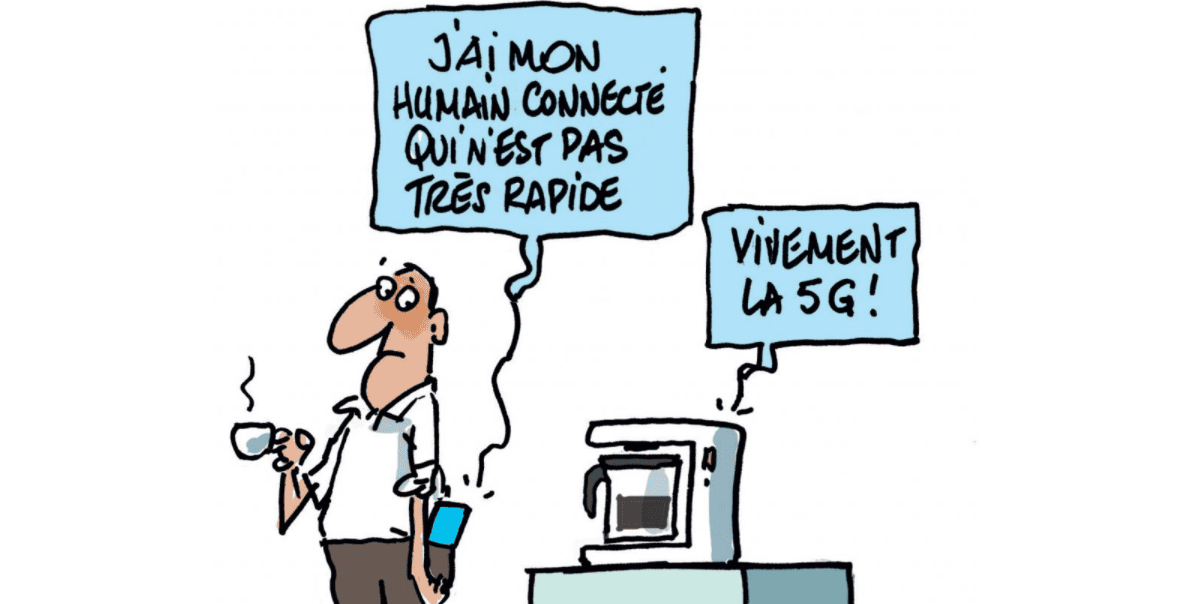Should we really shift to 5G?

FOR
“A technology we need in order to cope with the data explosion.”

Former commercial director for Bose, Gauthier Dalle (E.10) co-founded Odiho, which transmits audio content directly to smartphones in train stations and airports or during sports events. Its solution, which employs WiFi and 4G technology, was used to provide simultaneous translations during the HEC Alumni General Assembly.
By 2025, according to Forbes magazine, the planet will have 80 billion connected devices, from smartphones to drones, including sensors in intelligent cities. These devices will produce some 180 billion gigaoctets (Go) of data every day. The 4G network is already close to saturation and can’t handle this volume of input. 5G is the next generation of mobile networks. It has several advantages. Along with increasing the number of possible simultaneous mobile connections, it is 10 times faster than 4G.
In addition, its lag time will be .01 per second (compared to the current .27 per second), which is the time it takes the human brain to recognize an image! This will allow, for example, a surgeon to move robotic arms over a patient from a distance. The capacities of this technology will also facilitate the development of many new services, like 4K (and soon 8K) video, communication between machines, or even, in a more down-to-earth example, telecommuting, by making videoconferencing less unstable and jerky.
A breakthrough technology
5G will also stimulate the development of virtual and augmented reality. Engineers equipped with virtual-reality headsets will be able to work together on a research project from a distance by using 3D imaging – which is a technology that consumes a lot of data. Information will be transmitted via the cloud and analyzed almost in real time. Eventually, terminals will have sensors but won’t be able to make calculations on their own. Everything will pass through the cloud, which offers an almost unlimited capacity for treatment and storage. A drone or a self-driving vehicle will send images to virtual data centers, which will analyze these images and tell the drone or vehicle what to do – for example, to put on the brakes to avoid hitting a person crossing the road. The fast speed of 5G is essential for applications like these! An autonomous car will produce almost 4,000 Go per day, compared to 1 or 2 Go for a current smartphone…
Finally, we don’t yet know all the potential uses of 5G. Remember that 3G, launched in 2002, wasn’t fully exploited until 2007, with the explosion in smartphones. France shouldn’t miss the 5G boat. It’s a strategic technology, as the Huawei case illustrates. President Donald Trump fears China’s rapidly growing economic power. Europe should prepare itself; there’s no time to waste!
AGAINST
“5G is a destructive and authoritarian technology”

Based in Quebec for almost 20 years, Yves-Marie Abraham (D.04) is an associate professor at HEC Montreal, specializing in sociology and economics. He created one of the first university-level courses in “sustainable degrowth” and in 2019 he published “Guerir du mal de l’infini: produire moins, partager plus, décider ensemble” (“Cure the Infinity Sickness: Produce Less, Share More, Decide Together”)..
After the revolt against the installation of “intelligent” meters, the development of 5G has also proved to be highly controversial. I’m glad to see that a growing number of citizens are concerned about the consequences of this next generation of mobile networks. In fact, the ecological disaster in progress will be accelerated by 5G. This new network won’t replace existing ones but will rather be added to them. It will facilitate the production over the next few years of billions of terminals and connected devices whose ecological footprint hasn’t even been assessed – whether in terms of the energy they use, the materials they’re made of, or the waste products they generate. 5G will also boost global electricity consumption, and 60% of this electricity is still being produced by fossil fuels (gas, oil and coal).
Some claim that this technology will allow us to use less energy since it’s more efficient, but this argument is fallacious. We’ve known for 150 years, ever since the publication of “The Coal Question” by the British economist William Stanley Jevons, that introducing a more efficient technique will result in augmenting the use of related resources, since the costs of using these resources will be reduced.
Health and social risks
Along with the ecological damage it can cause, 5G also poses an immediate health risk, according to a growing number of researchers. Exposure to the short waves employed by 5G could not only increase cancer risks in humans, but could also affect their reproductive systems, memory and learning capacity. This is why, in 2017, scientists called for a moratorium on 5G in the European Union. Nearly 400 researchers and doctors all over the world have signed a petition in favor of a moratorium. The other reason to welcome this opposition to 5G is political. The industrialization of our civilization has been based on technologies that are not only harmful for the environment but also alienating for individuals.
As the American philosopher Henry David Thoreau observed more than a century ago, “Men have become the tools of their tools.” Things presented to us as simple means for reaching our goals in fact deprive us of the possibility of deciding how we want to live together. 5G is one of the latest of what the historian Lewis Mumford calls “authoritarian technics”. Opposing 5G is the first step toward regaining our collective freedom, even if it means giving up – at least a little bit – of our desire for individual power.
Published by Thomas Lestavel

